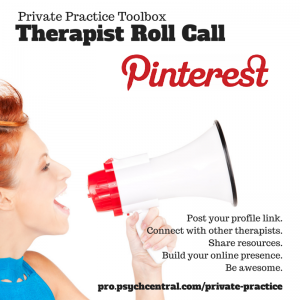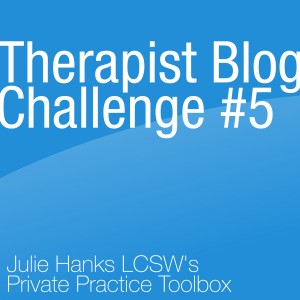While TV interviews and appearances rarely lead to an immediate increase in new clients, they do raise awareness of your private practice and your specialty areas, expose thousands of people to your practice, and set you up as a credible expert in your field. Marketing experts say that it generally takes 7 exposures to your business brand before a client will actually try your products or services.
In recent posts I share how to get TV interviews and how to present your best self during interviews. Here are some tips for getting the most mileage out of interviews to build your credibility and increase referrals to your practice.
1) Be explicit about how you'd like to be introduced
Reporters aren't worried about your branding, they're concerned about their story. It is your responsibility to protect your practice name and brand by being explicit about how the interviewer should refer to you on camera. After having a few interviews where they say my practice name incorrectly, or didn't mention it at all, I've learned to clearly spell out how I want to be introduced. In email correspondence with media contact I request something like this:

Please refer to me on camera as "Therapist Julie Hanks LCSW, Director of Wasatch Family." I also request a lower-third banner (the text box graphic that pops up at the bottom of the screen during interviews) with my name, credential, practice name, and website during the interview. Here's what I ask for: "Julie Hanks LCSW, Director of Wasatch Family Therapy, WasatchFamilyTherapy.com".
2) Request a link to your website
Always request that the interviewer mention your website address during the interview and shows your website address on a lower-third banner. You want to make it as easy as possible for potential clients to find your practice website, and ultimately, set an appointment. Additionally, if the TV station posts a web article or video online request that they post a link to your website. Having large websites link to your website improves your visibility Google searches.
3) Capture the video to post on your website
I suggest keeping an archive of all TV interviews so you can use them on your own practice website. Many TV stations post the interviews online and allow you to imbed them on your own website without uploading and converting the video. If the interview is not available online, you can request a DVD copy of the segment from the TV station.
4) Post on social media
Social media video sites, like YouTube, allow TV interviews to reach beyond the live TV viewership. I upload every TV interview to my YouTube channel and set up feeds to my websites and social media profiles and pages. The Men's Doc Will Courtenay, PhD, LCSW says that many clients have viewed his interview clips online before actually meeting with him:
Now that we can post TV interviews on websites and YouTube, they're really a great opportunity for marketing. And it's really the best kind of marketing, because the television show or news station has identified you as an expert. Today, many people search for and Google psychotherapists to see what they can find out about them before they meet with them.
Psychotherapist Terrence Alspaugh, LCPC says that YouTube videos give potential clients a feel for his style and expertise giving them the confidence to set an appointment.
I had the interview posted on YouTube with a link from my website, and that exposure has helped to attract new clients. Several prospective clients told me that they watched the YouTube clip first, and as they were favorably impressed, they contacted me about couples counseling. The interview has been watched by over 400 people, so it serves as a way for prospective clients to see me in action before meeting me.
Private practice therapist with YouTube channels
Enjoy watching these private practice therapists videos on their YouTube channels.
Dr. Will Courtenay
Eileen Kennedy Moore, PhD
Shift You Life Now Tracy Latz, M.D., M.S.
Julie de Azevedo Hanks LCSW
 Do you use Pinterest? I do and I have found some amazing relationship and emotional health resources for my clients and practice building resources. I've also found that it's a great way to direct visitors to my website and learn about my services.
Do you use Pinterest? I do and I have found some amazing relationship and emotional health resources for my clients and practice building resources. I've also found that it's a great way to direct visitors to my website and learn about my services.


As healers, we genuinely like to do our work. Guiding clients through the therapy process and seeing them make progress is why we do what we do. But if you're in private practice, you know there's a lot going on in the back end and that it's crucial to run an efficient and organized business.